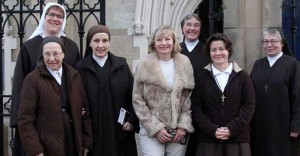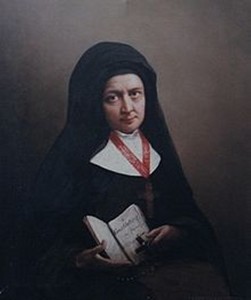
By Susan Gately - 17 October, 2014

Martina Purdy
A well known political journalist is quitting work with the BBC to enter religious life.
Martina Purdy worked for 15 years as a political reporter covering the major events of the unfolding peace process and the establishment of the Northern Ireland Assembly.
Announcing her decision last week she said she realised many people would not understand .
“It is a decision that I have not come to lightly, but it is one that I make with love and great joy. I ask for prayers as I embark on this path with all humility, faith and trust.”
Ms Purdy, who also worked with the Belfast Telegraph, is joining a small order, the Sisters of Adoration and Reparation who have one of their three convents in Belfast.
The order provides round the clock adoration of the Blessed Sacrament and makes the altar breads for most of the parishes and institutions in Down and Connor and also parts of Derry diocese.
Their small beautiful Chapel of Perpetual Adoration is on the Falls Road, near Clonard Monastery.
Bidding farewell to the life of a journalist, Ms Purdy wished politicians well “in their future endeavours and asked the media to respect her privacy and “that of the religious congregation which I am entering as I face up to the new challenges of my life.”

Martina Purdy with Adoration Sisters, Belfast
Paying tribute to her former employers, the BBC, she said working with them had been “immensely rewarding profession and I’m very grateful for all the support I’ve had over many years from colleagues, family, contacts and friends,” she added.
She thanked the BBC for the opportunities they had given her. “The BBC has always been very supportive of my work.”
Her statement continued: “I want to wish all my colleagues all the very best both here and at Stormont, especially my friends in the political unit. I shall miss them very much.”
Ms Purdy said she would not be making further comment on the matter, but such was the reaction to her announcement that she later tweeted “Thanks all for your generosity – from those of my faith, other faiths, those trying to find Him, those trying to ignore Him. God bless you.”
And in a final tweet, she added: “I’m not planning a running commentary – but I’m truly overwhelmed. x.”

Sister Marie-Thérèse of the Heart of Jesus, founder The Sisters of Adoration and Reparation
The Sisters of Adoration and Reparation was founded by Théodelinde Dubouché, known as Sister Marie-Thérèse of the Heart of Jesus following the French Revolution in 1848 at rue d’Ulm in Paris.
Théodelinde came from a well to do family without religious faith and had a great talent for painting.
In her twenties she combined a life of prayer with the pleasures of the arts – music, theatre and painting, spending up to eight hours a day in her artist’s studio.
Over time she developed a love for others and the poor. From 1846 to 1848 she had three visions – of the Eucharist, Jesus Crucified and the Heart of Christ.
Arising from these, she decided to form new religious community, the Sisters of Adoration and Reparation.
On 27 May 1849, Théodelinde took the habit and the new name, Sr Marie-Thérèse of the Heart of Jesus. A month later thirteen other women followed her into the community.
Six years later, living in a convents in Lyons, Sr Marie-Thérèse was badly burned while trying to save the blessed sacrament in a fire in the chapel.
She suffered great pain in the following years. Ten years after her original profession, she took her final vows, but was only to live another four years before dying, aged 54. Pope Pius X declared her venerable in 1913.
Currently the order has three convents – a mother house in Paris and two Irish convents in Ferns and Belfast.